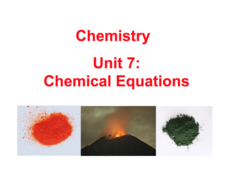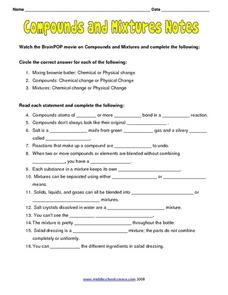Curated OER
Crystal Growing
Young scholars explore the different phases of a crystal. In this mineral instructional activity students grow their own sugar crystals using a sugar recipe.
Chymist
The Solubility of a Salt in Water at Various Temperatures
An educational activity allows young chemists to test the solubility of different types of salt at various temperatures. Groups create a graph using data from unsaturated, saturated, and supersaturated solutions.
Curated OER
The Ins and Outs of Equilibrium
In this equilibrium worksheet, students read about phase equilibrium and dynamic equilibrium. They answer nine questions based on their reading and their background in chemistry.
Curated OER
Titration: Standardization of a Base and Analysis of Stomach Antacid Tablets
Titration experiments don't have to give your high schoolers a stomachache. Study the ways to titrate an acide with a base in an engaging science experiment, which involves creating solutions and performing titrations. Pupils prepare a...
Curated OER
Dissolving Salt
Fifth graders, in groups, complete an experiment/activity in which they dissolve salt in a cup of hot water and then observe what happens as the water evaporates over the next few weeks.
DiscoverE
Creepy Putty
Mold your learners into materials engineers. Using glue, Borax, and water, scholars create a viscoelastic material. But your class might know it by another name—Silly Putty.
Curated OER
Water - the (Nearly) Universal Solvent
In this solvent worksheet, students explore why water is considered a universal solvent. Students explore what can change dissolving rates. This worksheet has 8 matching, 3 short answer, 11 fill in the blank, and 4 problems to solve.
Curated OER
Matter in Solution
In this solutions worksheet, students review types of solutions, concentration and saturation of solutions, and suspensions and colloids. This worksheet has 10 fill in the blank, 7 multiple choice, and 6 short answer questions.
Curated OER
Water - the (Nearly) Universal Solvent
In this water worksheet, high schoolers explore the reasons why water is considered a universal solvent. Students compare different ways to change the dissolving rate of a solute. This worksheet has 11 fill in the blank and 8 matching...
Curated OER
Relating Moles to Coefficients of a Chemical Equation
High schoolers investigate the coefficients in a chemical equation and their relation to moles. In this moles and coefficients lesson plan, students perform a single replacement reaction of copper (II) sulfate and zinc and find the ratio...
Science Friday
Capturing Carbon Dioxide
Why don't we just capture carbon dioxide in the air and store it somewhere else? A hands-on lesson allows scholars to explore a complex concept. First, they will create a carbonated beverage, and then they will determine if liquid...
Curated OER
Metals and Non-Metals
A table of the physical properties of metals and non-metals opens this high-school chemistry handout. Also covered are the chemical properties of metals and non-metals, reactivity, and fossil fuels. There are no specific questions to...
Normal Community High School
Chemical Equations
Viewers learn how to identify the substances in a chemical reaction, how to balance it, and the different types of chemical reactions by watching a presentation that also includes a review of monomers and polymers. The presentation ends...
Curated OER
Water Alchemy
After reading "Aquatic Alchemy," an article about recapturing water for reuse when in space, your class will use calcium hydroxide or hydrated lime to purify cloudy water. Geared toward high school chemistry or environmental science...
Curated OER
It's Freezing!
Here is a good activity for 5th grade scientists. In it, they look at a bar graph that shows the freezing point for a variety of liquids. Then, they are given a scenario of a certain liquid melting and freezing, and must determine which...
Curated OER
Chapter 12 Review, Mixed Review: Solutions
Although there are only six questions on this chemistry handout, it makes a thorough review of solutions. Novices explain why a compound is not an electrolyte, identify types of compounds, and calculate moles, grams, and molalilties in...
Curated OER
Sea Water Freeze
Learners observe how salinity affects the time it takes water to freeze. They participate in an experiment to determine that ice is essentially salt-free whether formed from fresh or salt water
Curated OER
What is Water?
Students examine water's properties. They participate in hands-on activities to show the properties of water.
Nuffield Foundation
Effect of Size on Uptake by Diffusion
Cell size is limited by the surface area to volume ratio, but why is this true? Scholars measure the surface area and volume of cubes before placing them into liquid. After a set amount of time, they measure the uptake by diffusion for...
Curated OER
Let's Think About Water
Students explore the different forms that water can take and conduct simple experiments to demonstrate some of its properties in each state. They watch a short video that illustrates some of these concepts.
Curated OER
Compounds and Mixtures Notes
In this matter learning exercise, students watch a movie and then compare the differences between compounds and mixtures. This learning exercise has 16 fill in the blank questions.
Curated OER
The Water in Our Lives: Kit Practice
Learners examine a local water source using testing kits to determine water qualitiy. They identify the pollutants and contaminants in each sample. They determine if samples fall within an acceptable range for drinking water.
Curated OER
Straw Chromatography
High schoolers separate food coloring using liquid chromatography. For this chemistry lesson, students explain the effects of different solvents on the rate of separation.
Curated OER
Moles
In this moles worksheet, students review solubility, moles of solute, molar mass, and colligative properties. This worksheet has 10multiple choice questions and 11 problems to solve.

























